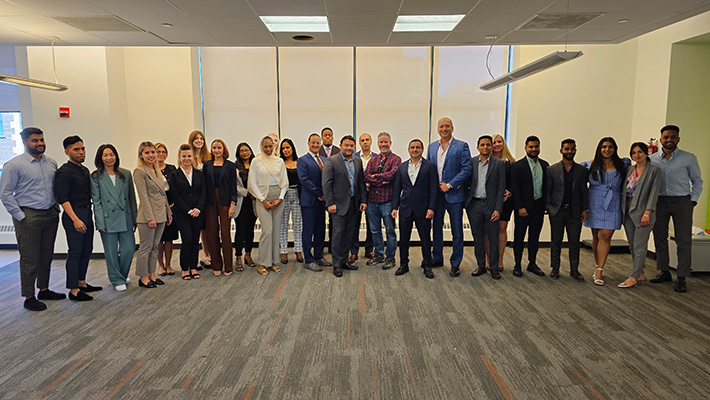Industry News
From A to D: How LCF is Aiming High
October 9, 2023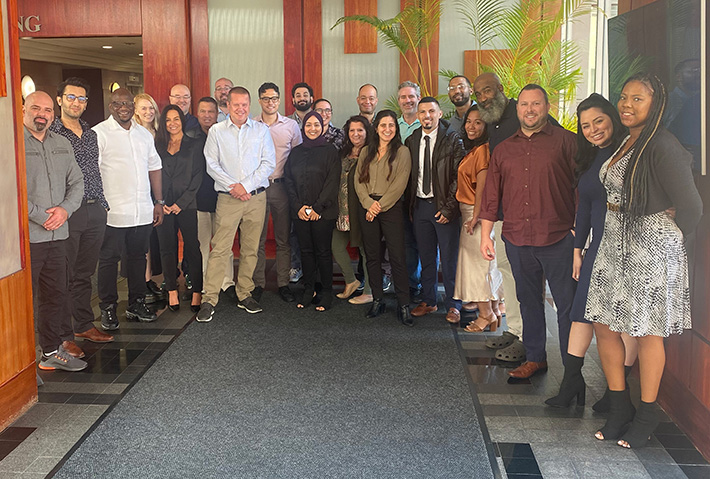
Robert Kleiber was a banker. He started his career at Citi in 2000 and rose up the ranks to become Head of Small Business Banking for North America by 2014. By then times were changing and disruptive fintech technology was becoming the talk of the town. Kleiber saw it firsthand and wanted in. So, he made the daring move to leave Citi in 2016 to go make his mark in the rapidly evolving world of small business finance.
He first served as the CFO of an NYC-based fintech company until another unique opportunity presented itself. It was at a growing company on Long Island that he hadn’t really known that much about previously. The way Kleiber tells it to deBanked, the company had a way of communicating the scale of its aspirations that got him really excited. He went for it. The company was called The LCF Group, a revenue-based financing provider that was headquartered in New Hyde Park. Today, Kleiber is the CFO & COO of the LCF Group. Founded in 2011, the company has solidified itself as a stalwart in what folks often call the “C & D paper” space.
“The goal,” Kleiber reveals, “is to be largest subprime funder by the end of next year.”
That’s a lofty ambition. In an industry oft-filled with big talk and rosy projections, LCF’s trajectory actually appears to support this possible outcome. Between in-office and remote, the company already has approximately 200 employees and it’s been on a hot streak of recruiting talent. Most compelling of all, however, is that LCF recently acquired select strategic assets and licensing rights to a well-regarded name in the industry, Reliant Funding. At the time of the announcement, the company said that “This strategic move not only enhances LCF’s portfolio but also empowers us to offer merchant funding through both ISO partners and directly under the LCF and Reliant brands.”
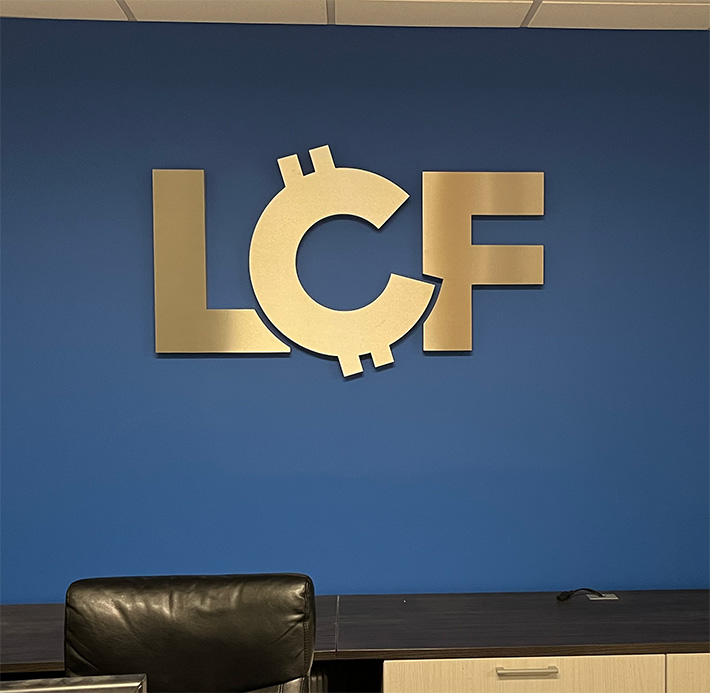 “On the direct side, our plan is to build up Reliant on originations […] and get them back to where they were before,” Kleiber says.
“On the direct side, our plan is to build up Reliant on originations […] and get them back to where they were before,” Kleiber says.
In that regard, LCF fully intends to leverage the Reliant name back into a powerhouse funding arm in the prime paper arena, first by going direct to merchant and then by taking on ISO/referral business for it. Between its two brands then, the company is on its way to covering the gamut from A – D. Unsurprisingly, all of this activity requires strong technology to make everything work. Kleiber says that they have 20-25 developers constantly building out their systems, which they rely on to not only increase the speed in which they can approve deals but also to achieve maximum compliance.
“We take compliance super serious,” Kleiber says. “Our differentiator is transparency, operating above board.”
LCF’s new Director of Sales, Jason Redding, who previously spent ten years at OnDeck, echoes same. “Even though it’s C & D paper, we’re doing this the correct way,” Redding says. Redding, who experienced the incredible ride at his former employer from startup to IPO and beyond, explains that LCF is giving him a similar feeling of what that journey was like. “Being part of something like that again is something I’m looking forward to,” he says.
And yet when it comes down to product, the company is perfectly content for the time being to focus on what they’re good at, which is revenue-based financing through and through. They’ve determined it’s better to lean in and try to be the best at something rather than try to offer too many different things.
At the LCF office in New Hyde Park, one can find various departments working to carry out the company’s mission. Among the introductions and small talk made during a walkthrough, one line uttered by a veteran member of their team stands out. “In this industry you don’t have to be earth shatteringly different, just operate with honesty, integrity, and transparency, and success will follow.”
Experts: How GFE Went Big
September 6, 2023The Brewster Building is an icon in Long Island City, a bustling district of Queens that’s right across the water from Manhattan. Most people know the building as the official headquarters of JetBlue because their giant logo on the roof can be seen from miles away. Others identify it as a major corporate hub for The Estée Lauder Companies since they sublease a substantial amount of office space inside. But up on the eighth floor, men and women traversing the hallways in suits work for another employer that’s making a splash in a different industry altogether. The sign on their door says GFE, which is short for Global Funding Experts. It’s a company that provides working capital to small businesses nationwide and they just recently secured a senior debt facility of up to $100 million.
Boris Musheyev, GFE’s CEO, founded the company almost a decade ago with partner Viacheslav “Steve” Eliyayev. Musheyev was working mainly in real estate when he learned about an innovative way to support small businesses by purchasing their future receivables. A cautious investor, he didn’t just jump right in. Instead, he bided his time with research on how it worked. He crunched numbers and analyzed the risks before he was confident it was something he wanted to do.
“From the outset, I’ve only channeled funds into ventures I wholeheartedly believed would both succeed and offer genuine value,” Musheyev told deBanked. “This commitment was evident in 2013 when we began by investing our capital.”
Alas, Global Funding Experts was born. The company’s model is referral partner driven, meaning they rely on ISOs for submissions and there’s no internal sales force. Today, GFE has an estimated 1,500 ISOs signed up and they receive about 700 applications on an average day. It’s a level of scale that wouldn’t be possible if they didn’t have an efficient CRM, something Musheyev predicted the necessity and utility of long before. GFE began building its own proprietary CRM in 2017 and the company used that to accelerate growth beyond its early startup days.
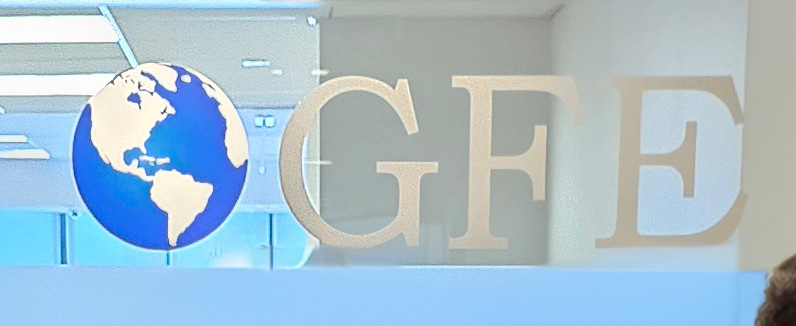 With its momentum, GFE brought on Boris Shakhmurov to serve as COO in 2019, a traditional banking executive with 20 years experience. Shakhmurov was previously an Executive Director at JPMorgan Chase and had overseen mainly cybersecurity, technology controls, and compliance before making his move to GFE. The two Boris’s knew each other previously, having been friends for over 30 years already. At GFE, Shakhmurov’s pitch that “banks don’t lend to small businesses” lands differently given his background.
With its momentum, GFE brought on Boris Shakhmurov to serve as COO in 2019, a traditional banking executive with 20 years experience. Shakhmurov was previously an Executive Director at JPMorgan Chase and had overseen mainly cybersecurity, technology controls, and compliance before making his move to GFE. The two Boris’s knew each other previously, having been friends for over 30 years already. At GFE, Shakhmurov’s pitch that “banks don’t lend to small businesses” lands differently given his background.
“As an expert in Governance, Risk, and Compliance, when I joined the organization in 2019, our goal was to establish a best-in-class MCA Operational Resilience framework to address current and future challenges facing our industry,” Shakhmurov said. “With a focus on building strong and resilient operational controls, we used a multidisciplinary approach to assess the risk across all of our information assets and business processes. The Zero Trust and Defense-in-Depth approach enabled us to focus on early detection, rapid response, enhanced protection, and reducing single points of failure throughout the entire MCA lifecycle.”
For all the technical talk, Shakhmurov said what really stands out is the firm’s family-like atmosphere, which one can see for themselves in their spacious office. That environment has been achieved all while tightly controlling and compartmentalizing access to data, the company says. Security is paramount.

With the infrastructure in place, GFE hired Jonathan Mayer to be their CFO, a veteran accountant who previously spent more than 10 years at Grant Thornton LLP. Mayer first met Musheyev and Shakhmurov in 2021 and he echoed a similar sentiment about how he ended up at GFE. “The work ethic and trust and family environment really stood out to me,” Mayer said.
Between Musheyev, Eliyayev, Shakhmurov, and Mayer, the firm was then off to the races, ultimately leading up to the securing of a debt facility last month of up to $100 million. A lot went into making that happen, including the enlistment of a well known industry law firm to perform the due diligence, they say.
“Through consistent communication with our merchants and operational adaptability, we’ve not only met but surpassed our profitability benchmarks, all the while ensuring minimal defaults in our portfolio,” Musheyev said.
The company also credits having a qualified CFO and robust CRM technology as being necessary ingredients to getting a serious deal done. GFE’s signature products include purchases of future receivables, reverse consolidations, and more recently something called “Incremental Funding.” There’s also no commission clawbacks, they tout. Overall, GFE has funded over $400 million in capital to small businesses since inception.
The executive team heaped praise on the staff for being integral to their success.
“What we have is trust,” Shakhmurov said, who comes back again and again to the importance of building a business that will endure. “If you look at the banking industry, you need operational resilience,” he said.
Only 1 Month Until deBanked CONNECT San Diego
August 21, 2023
There’s just one month until deBanked CONNECT San Diego. The Wyndham San Diego Bayside was thankfully spared any impact from the weather that passed through the area this past weekend, which means the big show is ON IN FULL FORCE! Here’s some of the speaking sessions you can expect to see:
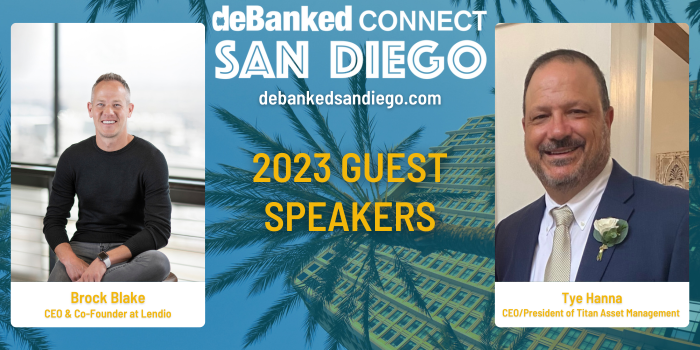
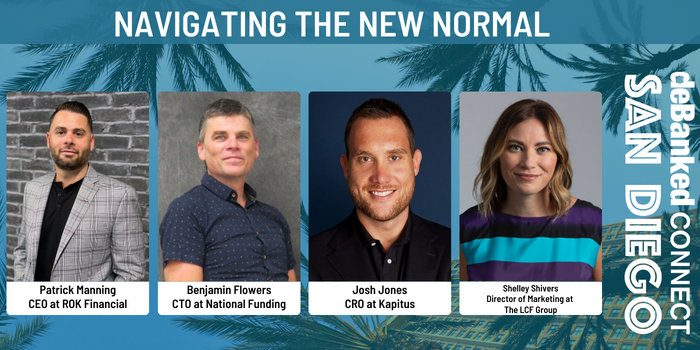
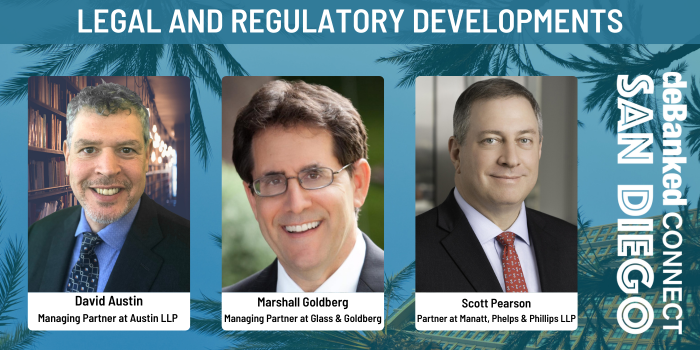
Plus, take advantage of the incredible networking opportunities that a deBanked CONNECT event offers!
We’ll see you there!
My Unique Experience Running a Print Magazine
August 12, 2023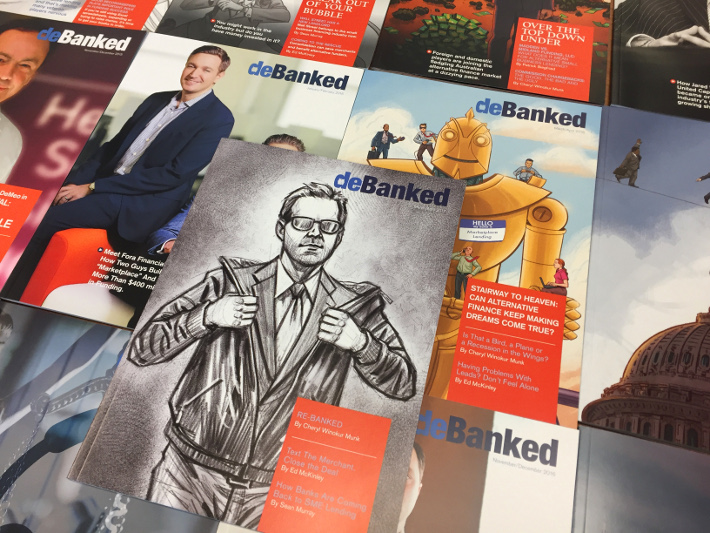 Two and a half years ago, the last ever physical version of deBanked Magazine rolled off the printer (Nov/Dec 2020). Some were shocked that we stopped it while those who knew the print business wondered how it had ever gone on for so long. It was a nice addition to our website, placing content in hard copy format and shipping it out to thousands of offices across the industry for a total of six times per year, every year. Covid disrupting the traditional office work arrangement made it impossible to keep a magazine going that had such a large percentage of office distribution. I wasn’t sad when I made the decision to cut the cord, more like relieved, for it was an extraordinarily tough product to consistently produce for very little return in exchange.
Two and a half years ago, the last ever physical version of deBanked Magazine rolled off the printer (Nov/Dec 2020). Some were shocked that we stopped it while those who knew the print business wondered how it had ever gone on for so long. It was a nice addition to our website, placing content in hard copy format and shipping it out to thousands of offices across the industry for a total of six times per year, every year. Covid disrupting the traditional office work arrangement made it impossible to keep a magazine going that had such a large percentage of office distribution. I wasn’t sad when I made the decision to cut the cord, more like relieved, for it was an extraordinarily tough product to consistently produce for very little return in exchange.
And that’s where my unique story begins. With an average print run of 3,000 – 4,000 per issue and distributed for free, our little b2b magazine left a big impression on many who received it. So much so that some subscribers began to wonder if the real lucrative business of this era weren’t all the financial products covered in the magazine but perhaps the magazine business itself! LOL. But on this I am not joking. Rumors spread and I found myself on the receiving end of both admiration and condemnation about how much profit people thought the magazine was probably making deBanked. The most common estimate I heard? That the magazine was guaranteed to be yielding at least $1 million per year just to myself personally after all the expenses. Which, man, would’ve been pretty awesome! Some threw out ballpark valuations for our magazine of $10 million (or even $100 million!!!!!) based upon assumptions that it made multiple millions a year in profit. Not the investment bankers of course, who knew better.
These numbers blew my mind, especially since I knew that they were very much rooted in complete delusional fantasy. If you want to know the truth, my internal personal valuation for our magazine had consistently been $0. This wasn’t some secret that I didn’t want anyone to know. I had just assumed it was obvious to all. I mean we were printing and mailing a free b2b magazine in the internet era. A magazine. A magazine…
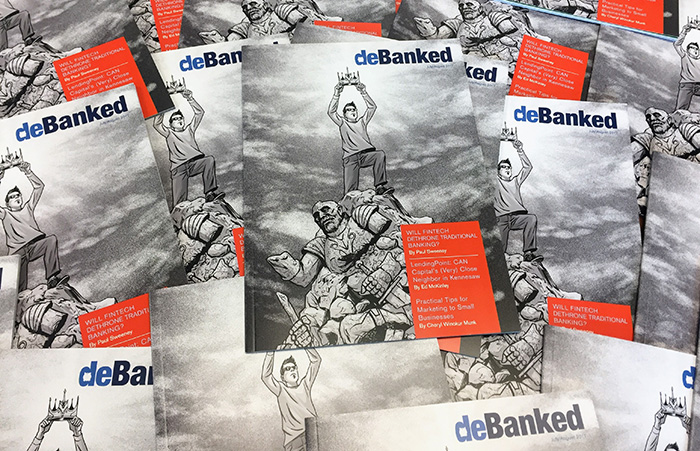 In a good year, deBanked Magazine (when examined as a standalone) generated somewhere between $5,000 – $9,000 in total profit. That was with no salaries because it couldn’t afford even one full time employee dedicated to working on it. Not even myself got paid from it. The personal financial benefit to me throughout was a whopping $0. Thus with its extremely tight budget I played the role that a normal publication might have five people for in addition to working with a small number of freelancers for help in order to do the parts I couldn’t. I spent nights proofreading with a highlighter and days trying to figure out how we were going to fill up 30+ pages in a single issue. It was an incredible amount of work and truthfully, I really enjoyed it, which was the entire reason it existed in the first place. I thought it was a cool way to reach people that maybe weren’t reading our website and it provided us with a channel to create some long form stories we otherwise wouldn’t have created. I did not have one ounce of regret throughout that it was not a great financial business to be in and I promised myself I would just do it until I didn’t want to do it anymore or it started to generate a standalone loss.
In a good year, deBanked Magazine (when examined as a standalone) generated somewhere between $5,000 – $9,000 in total profit. That was with no salaries because it couldn’t afford even one full time employee dedicated to working on it. Not even myself got paid from it. The personal financial benefit to me throughout was a whopping $0. Thus with its extremely tight budget I played the role that a normal publication might have five people for in addition to working with a small number of freelancers for help in order to do the parts I couldn’t. I spent nights proofreading with a highlighter and days trying to figure out how we were going to fill up 30+ pages in a single issue. It was an incredible amount of work and truthfully, I really enjoyed it, which was the entire reason it existed in the first place. I thought it was a cool way to reach people that maybe weren’t reading our website and it provided us with a channel to create some long form stories we otherwise wouldn’t have created. I did not have one ounce of regret throughout that it was not a great financial business to be in and I promised myself I would just do it until I didn’t want to do it anymore or it started to generate a standalone loss.
But I admit the experience was slightly marred by the perception of how much some believed we were making from it. Everybody seemed to know somebody who had been in the magazine business and had apparently become a billionaire from it. They supposedly knew all the numbers, assumed our numbers, and as a result it made any humility I exhibited about it come off as disingenuous. I actually ended up becoming the target of some unusual hostility that I could not seem to shake about its “success,” no matter how obvious on its face that it wasn’t what they thought. There are those that will apparently take what they see and invent numbers off of how something looks and then tell others that those are the real numbers. I guess you live and learn.
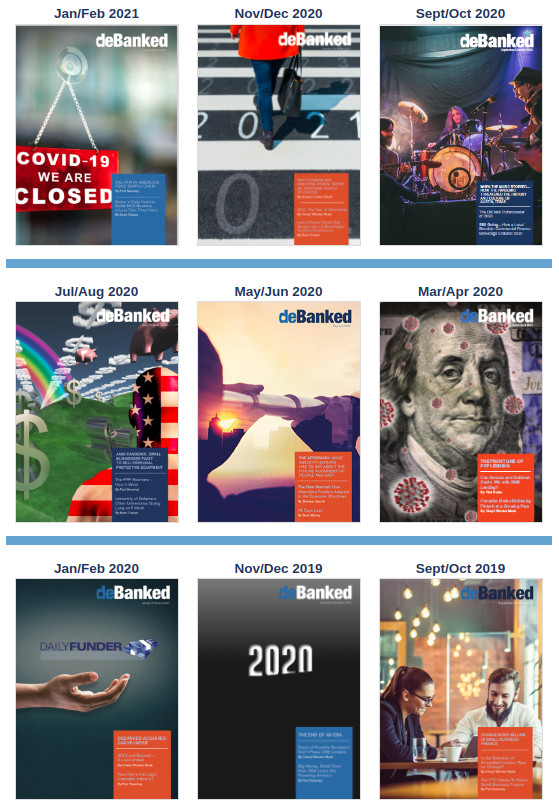 And so when my wife questioned why she sometimes found me sitting at the dining room table at 2am hunched over a stack of crumpled printer paper with yellow markers on one side and a cup of coffee on the other, I made sure to tell her that what she was seeing was a billion dollars in wealth creation. My big find of the night might be that a product that wasn’t a loan had been characterized erroneously with loan-like language.
And so when my wife questioned why she sometimes found me sitting at the dining room table at 2am hunched over a stack of crumpled printer paper with yellow markers on one side and a cup of coffee on the other, I made sure to tell her that what she was seeing was a billion dollars in wealth creation. My big find of the night might be that a product that wasn’t a loan had been characterized erroneously with loan-like language.
“Page 27, left column, 4th paragraph down, 3rd sentence, it says ‘repay,'” I’d write off to the printing press who was under the assumption that it was otherwise all ready to be scheduled for a job. “It shouldn’t say repay, it should say….”
Which was then replaced by something too long or too short that threw off the page count of the book and I’d wake up 3 hours later to be told that they’d need me to draw a chart, create a half page article, or maybe curate some photos to take up some space. “Also, there’s something wrong with the bleed on page 4 and these other photos you sent are RGB not CMYK,” I’d be told. “This needs to be fixed right now to meet the new deadline because you already missed the last deadline.”
Such is the mystical story of it all, the coming together of words on paper that then got sent in the mail. A good number of people enjoyed them. That was the reward. When it could no longer break even despite having no employees, I made the call to cut it. It was a lot of fun to be in print while it lasted. Also a heck of a lot of work. We tried a digital only version for a while thereafter but it just wasn’t the same.
I have a tendency to sell things at just about our cost of doing them because I know other companies have tight budgets. The hope is that people will like what we’re doing, it’ll have a positive impact, and they’ll want more of it. That’s pretty much what makes me tick. Had I another motive and the temperament for it, I’d be out there doing all the stuff that the people I write about are doing. It does look fun, but it also looks like a lot of hard work!
I don’t believe the magazine will ever come back, but I’ll never forget the experience of doing it.
Summer Dealmaking
July 18, 2023The summer of 2023 has not disappointed. The industry is making moves! In case you missed what moves we’re talking about, here’s a list of the most notable:
7/17/23 – Nav Acquires Tillful
7/14/23 – IOU Financial announces it is being acquired
7/12/23 – Loanspark expands to Canada
7/10/23 – Owners Bank launches SMB loans
6/29/23 – Blue Bridge Financial extends and upsizes corporate note to $20M
6/15/23 – CFG Merchant Solutions surpassed $1B in MCA originations
6/13/23 – Merchant Growth acquires small business loan rights from Loop
Sales, Tech, Funding, and the Law in California
July 7, 2023deBanked sat down with three individuals from across the spectrum of the small business finance world in Southern California.
With David Austin, an attorney and Managing Partner at Austin LLP, we discussed merchant cash advance law and the importance of legal counsel to run one’s business correctly.
With Trey Markel, VP Sales & Marketing at Centrex Software, we discussed corporate finance, AI, blockchain, tech, and more.
With Justin Thompson, Chief Revenue Officer at National Funding, we talked about what’s changed in sales and the state of selling.
They’re all on deBanked TV or listen to them on Spotify!
And don’t forget to register for deBanked CONNECT San Diego!
Can’t Watch Videos In the Office? deBanked is On Spotify
June 30, 2023Can’t watch videos on company time? Catch up with what’s going on in the industry by listening to deBanked’s podcast on your commute. With more than 500 deBanked TV segments altogether since 2020, we’ve been adding some of the most memorable and informative ones to Spotify.
Recent interview guests include:
- Justin Thompson – National Funding
- Andrew Carman – PerCina Report
- Steve Geller – Leasing Solutions LLC
- George A. Parker – VenSource Capital
- Nancy Robles – Eastern Funding
- Alyssa Guglielmi – JRG Funding
- Porsha Brooks – Lenpick
Fintech Nexus AKA LendIt Discontinues Its Large-Scale Event Business
June 29, 2023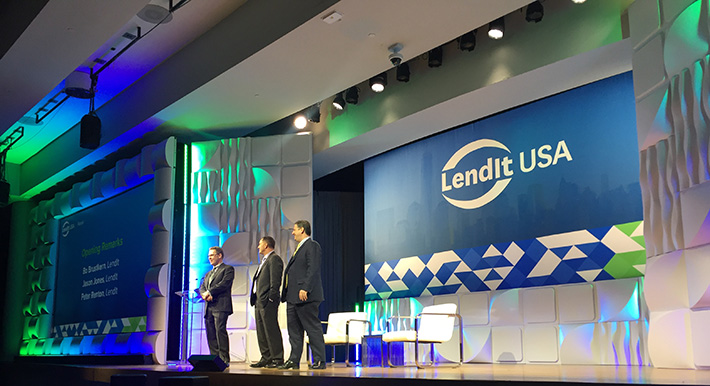 Fintech Nexus, which began as the LendIt Conference in 2013, announced it is exiting the large-scale event business after a 10-year run.
Fintech Nexus, which began as the LendIt Conference in 2013, announced it is exiting the large-scale event business after a 10-year run.
“This is not a decision we took lightly,” wrote co-founder Peter Renton in a blog post. “We know many of you have loved coming to Fintech Nexus events for many years. And we have loved bringing you those events. But after 10 years of doing that, it was time to move on to the next chapter.”
Fintech Nexus plans to focus on its online digital media business going forward.
Fintech Meetup, a recent rival to Fintech Nexus, is acquiring Fintech Nexus’ sponsors, exhibitors, and attendees.


